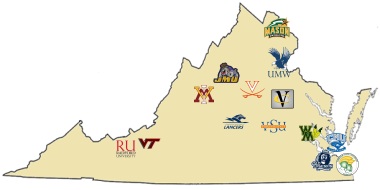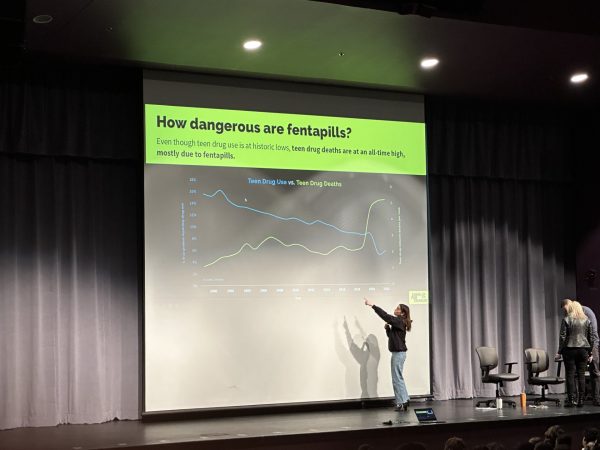What Virginia Colleges Look for in Applicants

For the Class of 2017, college applications are right around the corner. There are test scores, transcripts, essays, personal statements, and countless other pieces, but how much is each component actually taken into consideration?
I asked admissions officers from popular Virginia schools, such as Virginia Tech, UVA, and JMU, what their opinion is on what the least and most important aspect of an application is. (If the information was available, I specifically asked admissions officers specializing in Northern VA students)
Virginia Tech (Chris St Jean)
- What is the most important item (SAT/ACT scores, GPA, class vigor, counselor/teacher recommendation letters, etc.) that Virginia Tech looks for and why?
Virginia Tech has a very holistic approach when reviewing applicants for admission. We consider many factors when we personally review each applicant’s file. Our goal is to make as many offers as we can. One of the most important academic areas we consider is the student’s strength of curriculum and their performance in the classroom 9-12th grades. We do not consider GPA but instead, look for a strong mix of A and B letter grades in some of the challenging courses offered at Dominion HS.
Another important area in our process are the personal statements we invite the students to select. Hearing the students voice through the personal statements is both important and welcome.
- What is the least important item (SAT/ACT scores, GPA, class vigor, counselor/teacher recommendation letters, etc.) that Virginia Tech looks for and why?
Of the items you’ve listed, the least important would be the letters of recommendation. We do require letters of recommendation at all in our process so a student who doesn’t submit recommendation letters is not disadvantaged at all.
- Why should students consider attending Virginia Tech?
We love to attract well rounded students who have hearts for service, enjoy challenging classroom academics, want a hands-on, applied learning experience and who are looking for a close knit, nurturing community to call their college home. These three fundamentals: service, applied learning and community, have been at the core of everything we do at VT since we were established in 1872. With over 100 majors, 700 clubs and activities, and students from all 50 states and countries from around the world, we offer a rich and diverse community for students explore and achieve whatever personal, academic or professional goals they set for themselves. As a bonus…….we also have the #1 ranked college dining program in the nation. Come for a visit and experience all this for yourself! Visit us: http://www.admiss.vt.edu/visit/
University of Virginia (Ashley Milligan)
- What is the most important item (SAT/ACT scores, GPA, class vigor, counselor/teacher recommendation letters, etc.) that UVA looks for and why?
The most important thing UVA looks at in a student’s application is their high school transcript. What courses a student has taken, based on what their high school offers, and how a student performs in these courses is the single most important thing the admission office looks at when evaluating an applicant.
- What is the least important item (SAT/ACT scores, GPA, class vigor, counselor/teacher recommendation letters, etc.) that UVA looks for and why?
I think it’s tough to label anything as “least important,” because all of the components of an application are important in different ways. I guess if I had to pick, recommendation letters would probably be the least important. Rec letters tend to be generic and positive. Sometimes, though, you’ll come across a stellar recommendation letter that will really bolster a student’s application.
- What sets UVA apart from other schools?
I think UVA’s rich history and tradition helps set us apart as an institution. In addition, we’re able to offer a wide range of academic opportunities and student activities all while maintaining our status as a public university. Being able to offer world-class offerings while still serving the state of Virginia and our Virginia and out-of-state students puts us in a special position as a university.
Christopher Newport University (Yoma Miller)
- What is the most important item (SAT/ACT scores, GPA, class vigor, counselor/teacher recommendation letters, etc.) that CNU looks for and why?
We take great pride in our holistic application review process here at CNU. I must say that grades and rigor of academic program are at the forefront of our review process because those things are the best predictors for academic success.
- What is the least important item (SAT/ACT scores, GPA, class vigor, counselor/teacher recommendation letters, etc.) that CNU looks for and why?
We do provide applicants the opportunity to interview and send recommendations as a way for us to get to know a student better. This information is helpful but does not surpass an applicant’s high school career.
- Why should students consider attending CNU?
Here are just a few reasons that students choose CNU:
CNU is a young university: We were founded in 1960 as Christopher Newport College, an extension of the College of William & Mary, and received full university status in 1992. While we do have some fine school traditions, there are plenty of opportunities to start your own and to leave a lasting legacy at CNU.
Our class sizes are much smaller than most state universities; nearly half of all CNU classes have fewer than 19 students. Thanks to our high faculty-to-student ratio, you have a greater opportunity to connect with professors and develop mentoring relationships.
No matter what your interests are, there is something for everyone at CNU. Our more than 225 clubs and organizations and 23 successful athletic teams provide a wealth of cultural and social events to choose from.
William and Mary (Kate Perry)
- What is the most important item (SAT/ACT scores, GPA, class vigor, counselor/teacher recommendation letters, etc.) that William and Mary looks for and why?
There is no one most important item. We have a holistic review process so we look at all of the pieces and each weighs a little differently for each student. I usually start a read with the academics just to get a sense of what you are like as a student as you have spent the last 4 years building your high school transcript. Then we work our way through the rest of the application from there.
- What is the least important item (SAT/ACT scores, GPA, class vigor, counselor/teacher recommendation letters, etc.) that William and Mary looks for and why?
Similarly to question 1, there is no least important piece. We do truly take every part into consideration through our two read process and committee discussion.
- Why should students consider attending William and Mary?
Because we offer a valuable liberal arts and science education at a public institution with fantastic opportunities for undergraduate research and study abroad. We boast a small student to faculty ratio with small classes and engaging and caring faculty members. The W&M community is a family and we are welcoming and encouraging of each and every member. As one student put it “William & Mary is not for everyone, but it is for anyone”!
George Mason University (Jacqueline Mosley)
- What is the most important item (SAT/ACT scores, GPA, class vigor, counselor/teacher recommendation letters, etc.) that GMU looks for and why?
We do a holistic review so everything you send will be reviewed. I would say most important is the high school transcript. We look at course vigor, trend and the actual weighted grade. I would say this is most important because it shows the students academic over 3/3.5 years.
- What is the least important item (SAT/ACT scores, GPA, class vigor, counselor/teacher recommendation letters, etc.) that GMU looks for and why?
I would not necessarily say any one item is least important. It depends on the student and the documents sent it. If I had to pick one it would be the Secondary School Report. This sheet gives us a break down of what is an A,B,C,D,F at your school and your overall rank. I would say this is least important because we usually have high school profiles and your rank, while impressive, doesn’t weigh in decisions. - Why should students consider attending GMU?
Student should consider GMU because we are the best of both worlds. We have a suburban college campus but utilize DC with accessibility to internships.
George Washington University (Julia Reczek)
- What is the most important item (SAT/ACT scores, GPA, class vigor, counselor/teacher recommendation letters, etc.) that GWU looks for and why?
The George Washington University uses a holistic approach when reviewing students for acceptance into this university. This means that we look at the overall student, not just one part of their application, such as GPA, when determining acceptance. Also, we recently became a test (SAT/ACT) optional school for our application because highly value the students overall performance in high school, which includes both grades and course rigor.
- What sets GWU apart from other schools?
What sets GW apart from other schools is the experience our students have after studying here. Our location in the heart of Washington DC is incomparable, our academic support and courses are unique, and we prepare our students for their futures with superb professional connections and thousands of internship possibilities.
James Madison University
There are several factors that will be used to evaluate applications before decisions are made. These include the Program of Study, Academic Achievement, Standardized Test Scores, Secondary School Report Form, Extracurricular Activities, an optional Recommendation Letter and an optional Personal Statement.
The most important factor taken into consideration in the admissions process is Program of Study. The most competitive applicants will have taken at least four years in each core area: English, Math, Lab Science, Foreign Language and Social Studies. In Math, we look for students with at least one full year past the Algebra II level. While in Science, we recommend Biology, Chemistry, and Physics as a sequence. In addition, students who challenge themselves with the upper level courses offered in their high school (i.e. Honors-level courses, Advanced Placement classes, etc.) will increase their competitiveness for admission.
After considering coursework, the committee will then look at grades. Competitive applicants have achieved mostly A’s and B’s. We focus more on individual core academic grades than the overall GPA due to the varying range of how GPA is calculated.
We accept the SAT I and the ACT scores. Please send us ALL scores. We will take the highest critical reading and highest math on the SAT and combine them for the highest possible score. The composite score is used for the ACT. If both the SAT scores and the ACT scores are sent, we will take the best score.
We will accept the old SAT, the new SAT, and/or the ACT; we do not have preference. We super score the old SAT using your highest Math and highest Critical Reading scores from any combination of test dates. The two sections we will super score on the new SAT’s are Math and Evidence-based Reading and Writing. Test scores must be sent directly from the testing agency to be official.
The SAT I mid 50% range for the 2015-2016 freshmen class was 1090-1270. Please keep in mind that 25% of the scores fell below 1180 while 25% were above 1250. A comparable ACT score fell between 24 and 29. We do not have a minimum or cut off score, or a required score to be considered.
The admissions committee will also review the Secondary School Report form, extracurricular activities, one optional recommendation letter and an optional personal statement. If you as an applicant wish to have one included with your application, it must be requested by you via our online recommendation system during the application process. JMU will contact the recommender with instructions for submitting the recommendation letter.
For more information about the admissions process, visit: www.jmu.edu/admissions












